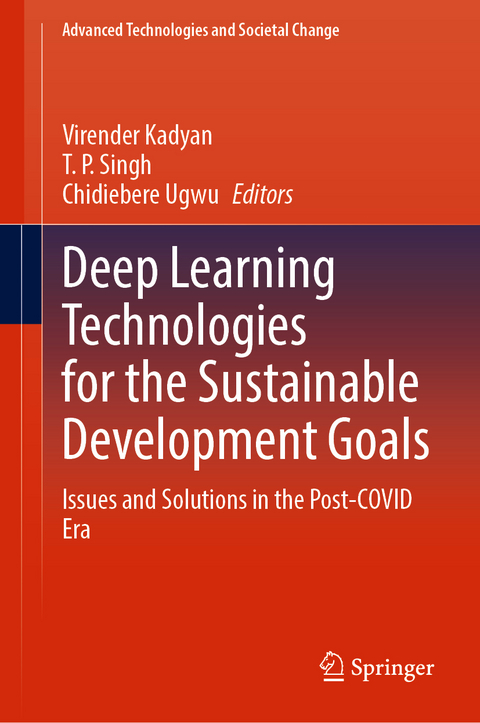
Deep Learning Technologies for the Sustainable Development Goals
Springer Verlag, Singapore
978-981-19-5722-2 (ISBN)
This book provides insights into deep learning techniques that impact the implementation strategies toward achieving the Sustainable Development Goals (SDGs) laid down by the United Nations for its 2030 agenda, elaborating on the promises, limits, and the new challenges. It also covers the challenges, hurdles, and opportunities in various applications of deep learning for the SDGs. A comprehensive survey on the major applications and research, based on deep learning techniques focused on SDGs through speech and image processing, IoT, security, AR-VR, formal methods, and blockchain, is a feature of this book. In particular, there is a need to extend research into deep learning and its broader application to many sectors and to assess its impact on achieving the SDGs. The chapters in this book help in finding the use of deep learning across all sections of SDGs. The rapid development of deep learning needs to be supported by the organizational insight and oversight necessary for AI-based technologies in general; hence, this book presents and discusses the implications of how deep learning enables the delivery agenda for sustainable development.
Dr. Virender Kadyan is currently working as Associate Professor in Informatics Cluster , School of Computer Science, University of Petroleum and Energy Studies, Dehradun, Uttarakhand, India. He has completed his Ph.D. and M.Tech. from Chitkara University, Punjab, in 2018 and Kurukshetra University, Kurukshetra, in 2013. His research interest includes automatic speech recognition and speaker identification & verification. Dr. T P Singh is currently positioned as Professor and Head, School of Computer Science, University of Petroleum & Energy Studies, Dehradun, Uttarakhand, India. He holds a Doctorate in Computer Science from Jamia Millia Islamia University, New Delhi. He carries 26 years of rich experience with him. To his credit there are more than 35 research publications and 6 edited books. Dr. Singh is a senior member of IEEE, member of various professional bodies including ACM, IEI, ISTE, IAENG, etc., and also on the editorial/reviewer panelof different journals. He is Fellow of IETA-India. His research interests are pattern recognition, machine learning and bulding intelligent hybrid systems. Prof. Chidiebere Ugwu is currently Director, Information & Communication Technology Centre(ICTC), University of Port Harcourt, Rivers State, Nigeria. He has successfully supervised many Ph.D., M.Sc, B.Sc projects and is currently supervising some. He is a Fellow, Nigeria Computer Society (FNCS); Member, Nigeria Professional Registration Council of Nigeria (MCPN); Member, Institute of Electrical and Electronics Engineers (MIEEE); Member, International Research and Development Institute (MIRDI); and Fellow, Institute of Corporate Administration of Nigeria (FICAN).
How Deep Learning can help in Regulating the Subscription Economy to Ensure Sustainable Consumption and Production Patterns (12th goal of SDGs).- Deep Technologies using Big Data in: Energy and Waste Management.- QoS aware service provisioning and resource distribution in 4G/5G heterogeneous networks.- Leveraging Fog Computing for Healthcare.- Intelligent self-tuning control design for wastewater treatment plant based on PID and Model Predictive methods.- Impact of Deep learning models for technology sustainability in tourism using Big data analytics.- Study of UAV Management Using Cloud Based Systems.- Contemporary Role of Blockchain in Industry 4.0.- SDGs Laid Down by UN 2030 Document.- Healthcare 4P: Systematic Review of Applications of Decentralized Trust using Blockchain Technology.- Implementation of An IOT Based Water And Disaster Management System By Using Hybrid Classification Approach.- Knowledge Representation to Expound Deep.- Learning Black Box.- Ann : Concept And Application In Brain Tumor Segmentation.- Automation Of Brain Tumor Segmentation Using Deep Learning.- Transportation Management using IoT Deep Learning to Predict various Traffic States.
| Erscheinungsdatum | 07.02.2023 |
|---|---|
| Reihe/Serie | Advanced Technologies and Societal Change |
| Zusatzinfo | 63 Illustrations, color; 20 Illustrations, black and white; XII, 246 p. 83 illus., 63 illus. in color. |
| Verlagsort | Singapore |
| Sprache | englisch |
| Maße | 155 x 235 mm |
| Themenwelt | Informatik ► Theorie / Studium ► Künstliche Intelligenz / Robotik |
| Naturwissenschaften ► Biologie ► Ökologie / Naturschutz | |
| Technik | |
| ISBN-10 | 981-19-5722-3 / 9811957223 |
| ISBN-13 | 978-981-19-5722-2 / 9789811957222 |
| Zustand | Neuware |
| Haben Sie eine Frage zum Produkt? |
aus dem Bereich


